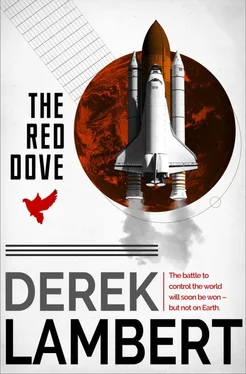Talin leaned across the instruments and shook Sedov. ‘What is it, Oleg? For God’s sake what is it?’
Sedov said: ‘There’s a hydrogen bomb in the cargo bay. When that red light comes on,’ pointing with one drooping finger, ‘it means it’s primed.’
His hand dropped and his eyes closed.
Behind Talin the radio bleeped.
Still stunned by Sedov’s words, he replaced his headset.
Sonya said: ‘Nicolay, what’s happening, I don’t understand?’
Her voice pierced his senses.
‘There’s nothing to understand.’
‘They say you may do something terrible with Dove. They’re crazy, aren’t they, Nicolay?’
‘Yes, crazy—’ No, he had to be honest with her; he owed her that. ‘There’s something I have to do.’
‘What are you talking about, Nicolay?’
He could smell her perfume, feel her hair, taste her lips and he said: ‘I shan’t be coming back.’
‘But tonight, the ballet, The Red Dove…’
Sadly he thought: ‘Even now she can’t see beyond the walls of the Bolshoi.
He said: ‘One day perhaps I’ll be able to explain. Just remember that I loved you. Then,’ harshly, ‘forget me.’
‘… so in a way we’ll be together. And while I’m dancing, I shan’t worry.’
Skates sang on the ice around them. He held her close and looked at her upturned face, and knew he would never forget the conflict of joy and sorrow he saw there.
Her voice from far away said: ‘But that means you’re a traitor.’
Was she reading hastily scribbled words thrust in front of her? It didn’t matter; her tone was hardening and, because he didn’t want to take that hardness with him, he said: ‘We shared, Sonya,’ and cut the radio connection.
This final black-out in radio communication between Dove and Mission Control was made at 1305 hours Moscow time, five minutes after television and radio coverage of the spaceflight had been mysteriously curtailed.
‘Get Massey.’ That had been gut reaction. Now, as he realised the full implications of what had been perpetrated – why Massey had so assiduously cultivated Talin, why he had evaded surveillance on at least two occasions –, Vlasov virtually took over the control room beneath the Kremlin.
Survivor’s instincts alerted, he told the President and the Minister of Defence what he believed was happening and, over the telephone, issued orders, their crisp authority overriding his own shock waves of panic. On his instructions Sonya Bragina had been patched through from a telephone at the Bolshoi to Dove. He hadn’t expected much from the connection and he had been right.
When his first burst of activity spent itself he leaned back and made what was a brilliant comeback considering the circumstances. Leaning back in his chair, he said to the two men who had been observing his performance: ‘This is just the sort of emergency I feared would be precipitated by Tarkovsky’s plan.’
Not bad in view of the fact the three of them had just learned that American Intelligence might be about to bring off an epic coup.
He attacked again: ‘With a rogue pilot at the controls of a Dove there’s every chance that he’ll bring it down in America providing the West with all the details they need of our strategy in space. And with a Dove transformed into a hawk an anti-Soviet propaganda catalyst that could turn the whole world against us.’
While he waited for Tarkovsky to assemble his forces, Vlasov wondered if Robert Massey would have been able to persuade Talin to defect if he hadn’t been armed with the information about Tarkovsky’s gunships and Dove’s bomb. The information that he, Nicolay Vlasov, had leaked to the United States Embassy in Moscow, in the hope that it would be used to muster world opinion against such madness. But he hadn’t anticipated anything on this scale.
One hundred and sixty miles above the earth Talin manhandled the slumped bodies of Sedov, Genin and Vinnikov into their anti-gravity suits and helmets. Without the suits their blood would drop to the lower parts of their bodies. The result in their comatose state would probably be death. Then he buckled them into their seats, donned his own suit and helmet and strapped himself into his seat.
At 0140 hours Moscow time he took over manual control of Dove, turned her tail-first and fired the orbital manoeuvring engines. Almost immediately Dove began to slip out of orbit.
The premature move by Dove was instantly picked up by American and Soviet radar scanners. Within seconds the information was passed to NORAD and Yevpatoriya, thence to the White House and the Kremlin.
Reactions in the US and Soviet capitals were vastly different.
Jubilantly, the American President replaced the receiver on the direct line from NORAD and said: ‘Here we go.’ At the same time he picked up another receiver and authorised the release of a statement to the media which had been warned to stand by for an important announcement.
The White House Press Room, fully staffed for the occasion, was galvanised into action. So were spokesmen at NASA, the Pentagon and all interested Government agencies.
CBS, NBC and ABC interrupted their programmes from coast to coast. Early risers on the east coast caught the interruptions and spread the word. Cities, towns, villages awoke prematurely.
At the same time the news blitzed across the world. In the morning, afternoon, evening or night, according to the time difference, families took up positions around TV and radio.
In Florida reporters, photographers and technicians raced to Kennedy Space Center where the Dove was expected to land at dawn followed by armadas of cars carrying sightseers. Nothing like it had been witnessed since the landing of Columbia in April 1981.
In the underground control room at the Kremlin the reaction was equally dramatic.
It exploded from Tarkovsky.
He said: ‘We have no alternative. We’ve got to hit Dove. With a charged particle beam weapon.’
He looked inquiringly at the President. Almost imperceptibly the President nodded.
Robert Massey had risen at 5.30 a.m.
From the window box on the balcony where he had buried them, he had retrieved the gun, ammunition, grenade and forged documents wrapped in oiled paper. (He had already delivered the powdered barbiturate the Ukrainian had given to him to Talin.)
Then he had driven in his black Zhiguli from Leninsk to Tyuratam because he had to see Dove launched, being as involved as anyone. And then? He would stick around to see if Talin went through with it. If he did then he would have to escape immediately because his involvement would be instantly apparent; if he didn’t then the escape wouldn’t have quite the same urgency.
And it wasn’t until later that Massey realised that he hadn’t heeded his own warning to Talin: that as soon as the messages warning American tracker and missile bases to stand by for a defection from space were decoded then the whole operation was blown – and the KGB would be on the hunt for its instigator, himself.
Being a cosmonaut and a companion of Talin, he hadn’t been body searched for a couple of weeks; he hoped today wouldn’t be an exception; it wasn’t.
After breakfast he was taken with the other cosmonauts on a bus to a box reserved for them in the spectator stand. As Dove roared majestically upwards Massey discovered that he was cleansed of guilt: if the information leaked to the American Embassy in Moscow was true then surely there was no reason for remorse.
After the launch they were driven, privileged observers, to the firing control room at Launch Control to watch Dove’s progress. What finer place than this futuristic chamber with its computer consoles, TV screens and complexes to observe when things started to go wrong – or right, according to your view.
Читать дальше
Конец ознакомительного отрывка
Купить книгу












